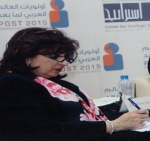Participants discussed progress on the Millennium Development Goals (MDGs) and on future Arab priorities for the post-2015 agenda at the regional workshop on “Post-2015 Development Priorities for the Arab World,” which took place in Amman, Jordan, from 3-4 March 2013.
A report of the workshop will be submitted to the UN High-level Panel on the Post-2015 Development Agenda (HLP).
 3 March 2013: Participants discussed progress on the Millennium Development Goals (MDGs) and on future Arab priorities for the post-2015 agenda at the regional workshop on “Post-2015 Development Priorities for the Arab World.” A report of the workshop will be submitted to the UN High-level Panel on the Post-2015 Development Agenda (HLP).
3 March 2013: Participants discussed progress on the Millennium Development Goals (MDGs) and on future Arab priorities for the post-2015 agenda at the regional workshop on “Post-2015 Development Priorities for the Arab World.” A report of the workshop will be submitted to the UN High-level Panel on the Post-2015 Development Agenda (HLP).
The workshop, which took place in Amman, Jordan, from 3-4 March 2013, was hosted by the UN Foundation and the King Abdullah II Fund for Development (KAFD), in collaboration with the Columbia University Middle East Research Center and the Jordan University Center for Strategic Studies.
Participants considered five themes: education and skills, including improving curricula and making learning more applicable to the labor market; growth, including measuring economic performance beyond gross domestic product (GDP) to include decent job creation and support microfinance; inequalities, including inequalities related to education, health, housing and civic and political participation; women’s empowerment and gender equality; and governance and freedom. Within each theme, participants discussed Arab-specific challenges and priorities, while also noting the cross-cutting nature of these themes.
Speaking at the event, Sima Bahous, Assistant Secretary-General, Assistant Administrator and Director of Regional Bureau for Arab States, UN Development Programme (UNDP), recognized progress on MDGs related to education, health and access to sanitation in the Arab region, while noting uneven gains, including on inequalities, maternal mortality, poverty reduction and access to improved water sources. She highlighted the post-2015 agenda as an opportunity for Arab countries “to define a roadmap through our most pressing challenges and towards our most cherished opportunities” and to address Arab priority issues, including governance, human rights, inequality, productive employment, rule of law and peace and security, as well as topics such as environmental sustainability, climate change, migration and social cohesion.
Bahous also said the UN has facilitated or will facilitate nine national consultations on the post-2015 agenda in Algeria, Djibouti, Egypt, Iraq, Lebanon, Jordan, Morocco, Sudan and Yemen, involving over 1,3000 people and an additional 5,000 via social media. She said the consultations highlighted environmental protection, inequalities, quality education and youth employment as priority issues. Bahous said the UN hopes to support additional national consultations and will also undertake additional regional consultations, in Beirut in March, and in Amman in mid-April.
At the closing session, Her Majesty Queen Rania Al Abdullah, an HLP member, welcomed the workshop’s regional focus, noting a need to understand regional approaches and development priorities to develop a unified vision for the post-2015 process. Summarizing the discussions, Omar Razzaz, Chair, KAFD, highlighted similarities between Arab and global priorities whole noting that the Arab world faces particular challenges related to citizen participation, governance and sustainability. [Statement of UNDP Regional Director] [Jordan News Agency]